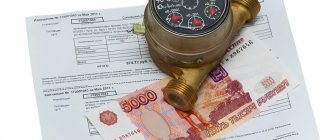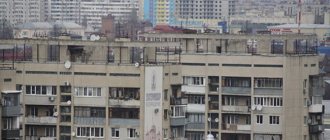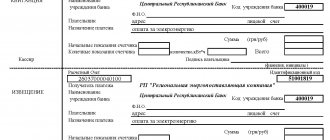Free legal consultation over the Internet 24 hoursLawyer on housing issues in St. Petersburg. Free legal consultation on labor disputes.
5/5 (22)
What is included in payment for housing and communal services
When living in an apartment building, residents are required to pay for utilities provided by the relevant companies.
Attention! These services include the following:
- electricity, the consumption of which is determined either by average indicators or by meter;
- electricity used in common areas and paid equally by residents;
- water supply, which includes hot (not lower than +40 degrees) and cold water, as well as preliminary purification of water resources entering the apartment (it is also permissible to install meters or use average indicators);
- heating, the indicator of which should not be lower than eighteen degrees above zero, and payment is made taking into account the size of the area of the heated room in the amount of up to 43 rubles per 1 sq.m. (the total cost will include payment for heating both the apartment and common areas);
- garbage removal, which is carried out not only during construction and repair work, but also in the process of maintaining a person, while the cost of such a service can reach up to six thousand rubles, since it is determined taking into account the area of housing and the mass of garbage being removed;
- sewerage, the cost of such a service is determined by the type of sewer system and the level of pollution associated with water drainage provided in an apartment building.
Also in the receipt for utilities you can see such items as major repairs, maintenance of the elevator and intercom, which also involves monthly cash contributions from residents.
Attention! Our qualified lawyers will assist you free of charge and around the clock on any issues. Find out more here.
If you have to save: how long can you avoid paying rent?
The property owner and responsible tenants must pay utility bills for living space; by law, this is their responsibility. If individuals do not pay the required amount within the established time frame, they are held administratively liable.
Consequences of non-payment of rent, debt statute of limitations and methods of repayment
If the consumer partially pays for utilities and services for the maintenance and repair of residential premises provided by the contractor, then the contractor divides the payment received from the consumer between all types of utilities specified in the payment document and the payment for the maintenance and repair of residential premises in proportion to the size of each payment specified in payment document. In this case, the contractor calculates the consumer's debt for each type of utility service based on the partially unpaid amount.
Underpayment by a consumer of a utility service is understood to mean that the consumer has a debt to pay for 1 utility service in an amount exceeding the sum of 2 monthly fees for a utility service, calculated on the basis of the utility service consumption standard, regardless of the presence or absence of an individual or common (apartment) meter and tariff for the corresponding type of utility resource,
valid on the day of restriction of the provision of utility services, provided that there is no agreement concluded between the consumer-debtor and the contractor on the repayment of debt and (or) if the consumer-debtor fails to comply with the terms of such an agreement.
We recommend reading: Benefits for armed veterans in the Krasnodar region
Dear readers! The article talks about typical ways to resolve legal issues, but each case is individual. If you want to find out how to solve your particular problem , contact a consultant:
Housing and communal services debt for 2 months - can they sue?
If a citizen falls into the category of defaulters, he will face punishment. The measures that will be taken to influence the offender are determined on an individual basis. First of all, penalties will begin to accrue.
The act is signed by the parties to the legal relationship that has arisen - the specialist performing the disconnection, and the debtor himself (or, in his absence, any other citizen registered in the apartment). Such a document does not require certification with a seal. You need to draw up 3 copies of the act.
What housing and communal services can you avoid paying for if you don’t live in an apartment?
If utilities are paid based on meters, that is, according to the volume of resources actually used, then if there are no residents in the apartment, a number of services will not be paid for, for example, electricity, gas, water, and in some cases even heating.
At the same time, receipts for payment for housing and communal services include such items as maintenance of premises, maintenance of common property, and so on. Payment for such services must be made even when no one lives in the apartment.
Attention! Calculator for calculating penalties for paying for utilities (Part 14, Article 155 of the Housing Code of the Russian Federation).
If there are no meters, then receipts will come with an average indicator, which will require an additional contact with the management company. However, no recalculation will be made.
Eventually
For debts on utility bills, citizens face seizure of property and accounts, suspension of service delivery until the debt is fully repaid, problems when traveling abroad, and tenants under a social tenancy agreement face eviction.
All situations described are subject to the general rule of the statute of limitations. In accordance with civil law, the period is three years. It is practically impossible to collect debts for the years preceding the specified period.
What does the Housing Code enshrine?
Issues of paying for utility services, determining the cost and procedure for fulfilling the obligation are regulated by the Housing Code of the Russian Federation (Section 7).
Utility payments are indicated in the following articles:
- Art. 154 of the RF Housing Code provides for the structure of the procedure for paying for utility services;
- Art. 155 of the Housing Code of the Russian Federation establishes precise rules for paying utility bills, determines the timing of such actions and places for filing;
- Art. 157 of the Housing Code of the Russian Federation establishes the amount of utility services according to meters, as well as the standards required when paying for housing and communal services in the absence of meters in the apartment.
Other provisions of both this code and other federal laws also apply.
For what kind of rent debt can you sue?
According to Article 155 of the Housing Code of the Russian Federation, payments for residential premises and utilities must be paid by the 10th of the next month. This means that the counting of the number of days of delay begins from the next day after the due date for making payment. As soon as a delay occurs, so-called “penalties” are charged on the existing amount of debt. Such a penalty should encourage the debtor to quickly fulfill his obligations. Moreover, the defaulter will constantly receive notifications about the need to urgently repay the debt. If you ignore these notices, the management company has the right to send you a subpoena.
We recommend reading: Sample Application for Extension of Maternity Leave to 3 Years
Not all property owners know that failure to pay utility bills can threaten them with serious troubles, including litigation. Then the management company, which has entered into an agreement for the technical operation and utilities of the house, may demand that the unscrupulous tenant be evicted. This measure is an extreme measure, but utility companies resort to it quite often. We will tell you in this article about in what cases you can be sued and how to properly protect your rights.
How to reduce rent and heating bills
Despite the fact that it is impossible to completely abolish the obligation to pay utility bills, the legislator allows you to submit an application to the management company.
It is necessary to indicate that no one lives in the apartment, so that you can receive bills less than those provided for if people live in the house.
Please note! Heating, house maintenance, use of common areas in the house - all this will inevitably have to be paid for, since it is impossible to turn off the heating for one resident so that he can avoid expenses, since this will affect the interests of other residents in the apartment building.
The management company does not recalculate utility bills.
How to find out and pay off your debt for an apartment, read here.
Is it possible not to pay rent if there is no agreement with the management company, read the link:
A service such as gas, for example, allows gas service employees to install a plug so that the flow of gas does not continue, since no one lives in the apartment.
This will reduce some of the costs. However, this option is possible only if the tenant of the apartment has no debts for gas supply. You will have to pay for such a service. However, if necessary, such a plug can be removed.
However, not every service can help you save money. For example, garbage removal does not imply a reduction in costs, since the issuance of an invoice does not depend on the fact that a person lives in an apartment, but on the presence of registration. To avoid paying for disposal, you will have to lose your registration.
You don't have to pay
Situations in which no one lives in the apartment do not exempt the person from paying utility bills. Payments for housing and communal services begin from the moment a person purchases real estate. The Housing and Civil Codes regulate the procedure for its calculation.
In situations where charges are made based on meter readings, the homeowner who does not live in the apartment may not pay for the services.
Such services include water supply, gas, electricity.
According to current legislation, each registered citizen in an apartment is charged a fee for one or another housing and communal services service . However, if a person does not live, but is registered in the premises, he may be exempt from paying for certain services, based on relevant supporting documents, with subsequent recalculation.
ATTENTION! It is possible to achieve a recalculation for services such as gas, water supply and electricity even if the person does not live in the apartment for even 5 days. However, you will need to provide documents confirming your residence in another premises.
Mandatory payment are those services without which a residential building may become unusable. They will have to be paid regardless of whether the person lives in the apartment or not. These services include:
- heating charges;
- rent;
- major or current repairs.
Heating charges can be reduced if its source is located directly in the room. This is done by reducing the heat supply temperature. to completely turn off the heating in winter , because this can harm the entire heating system and the entire apartment building.
There are services that a person who does not live in the apartment can refuse. This could include cleaning the entrances of apartment buildings and adjacent areas, garbage removal, parking fees, elevator maintenance and other services.
It is also possible to reduce charges for gas, water and electricity in cases where the apartment is being renovated, but in fact no one lives.
How to reduce utility bills if a person is registered but does not live
To save on utility bills, you must confirm your absence from your place of registration. It must be remembered that the period of absence should not be less than five days. To justify such absence, it is necessary to present documents so that the payment amount will eventually be recalculated.
Presentation of documents, sending an application and other actions allow you to reduce costs and recalculate the amount to pay for utilities. This happens five days after the application. However, the easiest way is to have counters that will record how many resources were actually spent by the resident.
Watch the video. If I don’t live, I won’t pay:
How to pay taxes on renting an apartment
However, this is in the past, the press service of the Federal Tax Service of Russia said. Tax laws have changed, and these changes came into force at the beginning of 2013. Now the subjects of the Federation have the right to calculate the potential income of an individual entrepreneur from the number of rental properties or their area. That is, if previously an entrepreneur acquired a patent, it did not matter whether he rented out one or several apartments, he paid the same amount. Now, with the new amendments, some justice will be restored, especially in relation to those rentiers who have only one apartment at their disposal.
It doesn't take much to become an individual entrepreneur. The application form P21001 is certified by a notary, a TIN certificate, a passport and a receipt for payment of the state fee in the amount of 800 rubles. All this must be taken to the tax office in whose territory you intend to carry out business activities. The tax authorities allow 5 days for registration, after which you will receive a certificate of tax registration as an individual entrepreneur. You can open a bank account and notify the tax office about it within 10 days. Compared to individuals who need to visit an inspection once a year, this no longer seems like the best option. However, that's not all.
01 Aug 2020 stopurist 385
Share this post
- Related Posts
- Deadlines for submitting individual information in 2020
- At what amount of debt do bailiffs impose arrests?
- Obtain a Certificate for Improving Housing Conditions in St. Petersburg for a Veteran of Combat Actions in Afghanistan
- Production characteristics for MSE for driver
How to recalculate utility bills
Why do you need to recalculate utility bills? First of all, such a tool is used when the management company providing services makes errors in accruals.
Recalculation serves as a way to resolve the problem, including if such errors were made due to the person’s absence from the place of residence for a long period.
Also, the need for recalculation arises when a person informs in advance that he will be absent, but there are no meters installed in the apartment.
Since averages are used to determine the specific cost of a service, it is only necessary to count the number of days that a person actually used the resources. This should be done in each direction: for the supply of gas, water, light, and so on.
Attention! Recalculation of the amount is allowed not only before receiving a warning about absence, that is, even before such a need arises, but also after the person receives a receipt for payment or independently submits an application for the implementation of the procedure. The main condition for this is that the absence must last more than five days.
It should also be taken into account that in addition to the minimum period of absence, a maximum limit is also determined. Recalculation is carried out only for the next six months.
Next, you will need to write an application again so that the indicators and standards can be re-evaluated. This is primarily due to the fact that legislation may be updated, which could affect the final payment amount.
Attention! Calculator for calculating penalties for paying for utilities (Part 14, Article 155 of the Housing Code of the Russian Federation).
To confirm your absence from the place of registration and not overpay the amount for utilities, you should submit the relevant documents, which may include the following:
- employee ID sent on a business trip, travel cards, tickets and other similar papers;
- medical documents confirming the fact of undergoing long-term treatment;
- a certificate establishing that the apartment was sealed or was under guard, which prevented anyone from entering and living there;
- document confirming temporary registration;
- hotel invoices establishing the fact of a person’s temporary residence at another address;
- a certificate from the institution where the child was located for a specifically established time required for recalculation;
- a document from the chairman of a cooperative or a summer residence association stating that a person lives at a summer house or other facility for a specifically established period of time.
ATTENTION! Look at the completed sample application for recalculation of all utility payments:
Responsibility for late payment of utilities
Many management companies and supplier organizations do not immediately respond to the debt incurred by the consumer. What doesn't happen in life? A person could get sick and end up in the hospital, be called by relatives to another city, or have to go on a long business trip for work. The homeowner could simply lose a permanent source of income, and now have nothing to pay with. Reminders will be sent in the form of receipts or phone calls over the course of 4-6 months.
However, in the future, when the amount of debt grows significantly, work with the debtor will certainly begin. To get their money for the services provided, resource supply and management companies will go to court and involve bailiffs to collect
from the debtor
the amount of the principal debt and penalties
.
The opportunity to contact a bailiff appears only after going to court and receiving a writ of execution. They go with him to the FSSP. The debtor's risk in this case is seizure of property and bank accounts
in accordance with Article 80 of the Federal Law on Enforcement Proceedings.
In addition, problems may arise with traveling abroad.
.
Utility services rarely resort to the services of collectors. First of all, it's expensive. Secondly, the high cost of the service hides a limited range of legal methods for debt repayment, which does not guarantee the success of the enterprise. Thirdly, the collectors themselves do not really like to contact utility debtors.
But there is another way to influence consumers who do not pay for housing and communal services. Before going to court, resource supply organizations may suspend the contract and stop supplying the service.
. Often citizens are not afraid of this, since a company employee will turn off, for example, electrical equipment, but will not guard it around the clock. Many citizens are able to reconnect without permission.
An extreme method of influencing debtors is eviction from the occupied residential premises.
But this method does not apply to everyone, but only to the tenant of an apartment under a social tenancy agreement. You can find out more about what else an apartment can be taken away for here.
Is the accrual legal?
According to the general rules of housing legislation, the calculation of the amount for payment of utility services in relation to a citizen is possible only if he is registered at a specifically specified address.
If no one lives in the apartment and is not registered, then there is no need to pay bills that for some reason come to such an address. However, not all services will remain unpaid when the person neither resides nor is registered there.
Homeowners, under any circumstances, must pay for heating, general and household needs of the house, because it is impossible to limit the supply of such resources to one person, that is, either the service is provided to all residents at once, or to no one.
What are the risks of rent debt in 2020?
- 1/300 part - this refinancing rate is valid in cases where no more than ninety days have passed since the first day the debt arose. A concept such as a refinancing rate denotes a certain percentage that is collected by government agencies specializing in monetary policy;
- 1/130 part - the refinancing rate increases several times if the debt is not paid for more than three months. For example, if the owner of an apartment must pay utility bills for four months (120 days) and the amount of debt is 4,500 rubles, then in order to calculate what penalty will be charged to him, it is necessary to perform the following mathematical operation: 4,500 * 120/130 = 415 rubles . Thus, the debt will no longer need to be paid in the amount of 4,500 rubles, but in the amount of 4,915 rubles.
We recommend reading: How to make an order to cancel travel on northern benefits
Interest on debt
If the owner of the apartment has not paid for gas supply for a long period of time, then the management companies will send him a warning requiring him to transfer material resources. If the money still does not arrive in the company’s account, then after another twenty days a warning will be sent again. If this document is repeatedly ignored by the owner, the supply of gas to his apartment will be stopped. The rules in accordance with which this procedure should take place are regulated by Government Resolution, serial number 549, which came into force on May 21, 2008.
Daily penalties may be assessed upon expiration of a month after the date of the obligatory payment. This comes from the rate of 1/300 of the refinancing rate from 31 to 90 days of delay and the rate of 1/130 of the rate after 91 days of delay.
Is the area of the loggia included in the total area of the apartment for payment of housing and communal services?
What is included in the total area of the apartment for which utility bills are calculated?
According to the Housing Code of the Russian Federation, namely Article 15, the entire area that serves to meet the needs and interests of apartment residents will be recognized as common.
Accordingly, the loggia also acts as part of the apartment, the area of which will be taken into account when calculating utility bills.
All rules for calculating area and utility bills are regulated in detail by special acts. With the question of the square footage of the apartment, which is necessarily taken into account when calculating the rent bill, you can refer to the Instructions for accounting for housing stock.
In addition, it should be understood that any room, even non-residential, which belongs to the apartment, and is also located in the entrance and serves for the general purposes of the residents of the house, will be included in the quadrature when making calculations. However, when taking into account a loggia, a reduction factor should be used, which is equal to 0.5, and if we are talking about taking into account a balcony - 0.3.
Grounds for the management company to sue the property owner
- In order to psychologically influence the debtor, employees of the management company post information about the debt on a notice board in a publicly accessible place. As a rule, such a measure has a significant impact on emotionally sensitive people. Also, information about unscrupulous payers is published in local media (although moral damages can be recovered from the management company for false information);
- accrual of penalties - a penalty is accrued in the established amount and amounts to one three-hundredth of the refinancing rate (Central Bank of the Russian Federation). The amount may seem small, but paying the fine for a long period of time will significantly hit your wallet;
- restriction of access (or deprivation of the opportunity to use) certain utilities (gas, hot water, electricity, etc.);
- turning to collectors is a fairly rare occurrence for collecting rent arrears. However, similar cases have already occurred in judicial practice. Moreover, the court makes ambiguous decisions, both in favor of the plaintiff and in favor of the defendant;
- deprivation of the opportunity to use living space for its intended purpose - in other words, eviction. Currently, people can be evicted only by court decision and only from a municipal apartment.
We recommend reading: Russian benefits for liquidators of the Chernobyl accident
If the owner of the apartment has temporary financial difficulties or a difficult family situation (for example, one of his loved ones is seriously ill), the management company can accommodate him halfway. Restructuring will make it possible to pay off debts to housing and communal services in installments, with a certain installment plan (the amount and timing must be negotiated with utility companies). The subsidy is a monthly financial assistance from the state to low-income citizens for six months. To receive such assistance, you should contact the social protection authorities rather than public utilities. Collect the necessary documents, register as low-income people. In addition to low-income citizens, the following can count on government assistance:
Ways to reduce payment
Attention! Speaking about specific ways to reduce the cost of utility services that will be recognized as legal, the following options can be distinguished:
- installing meters in the apartment for resources such as water, gas and electricity;
- purchase a heating meter, which will not completely eliminate the need to pay for such a resource, but will allow you to regulate the temperature and, accordingly, consumption indicators.
Accordingly, such devices will make it possible, in the event of the absence of residents, to transmit readings to management companies that are equal to zero, which will not imply any payment.
At the same time, you should always remember about documents confirming the fact of absence, otherwise the management company may provide assistance.
ATTENTION! Look at the completed sample application for checking meters:
The management company filed a lawsuit for non-payment of utilities
By the time the debt period begins to approach 6 months, the management company will begin to send appropriate notifications to the debtors. They will indicate the current amount of the debt, including the amount of penalties, and also indicate the actions that will be taken after the expiration of the specified debt repayment period.
- Long-term illness of the payer, during which he does not receive wages.
- Dismissal from work due to staff reduction, liquidation or bankruptcy of the enterprise, etc.
- Long delay in payment of wages.
- Difficult financial situation of the family caused by other valid reasons.
We recommend reading: How many loan debtors are there in Russia 2019









